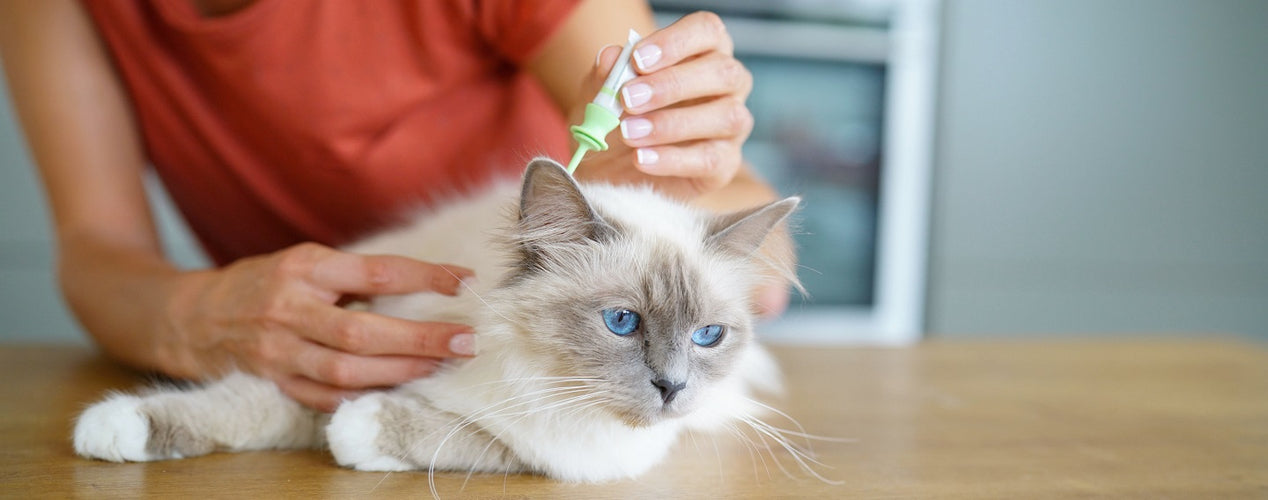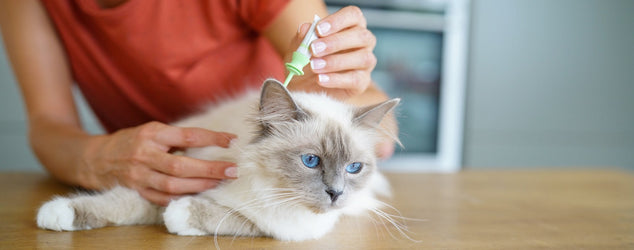

Posted by Emma Oldroyd, on
The Best Flea Treatments for Cats: Spot-On, Tablets & More
Whatever time of year it is, flea parasites can be a problem for cats. In summer, the natural heat brings out the fleas, and in winter, turning on the heating and creating a warm environment can bring them out- there’s no escape for our poor pets!

How do cats contract fleas?
Fleas can spread a variety of ways including:
- If your cat encounters another cat who has fleas (they can jump!)
- If your cat encounters rodents outside who carry fleas
- Throughout your home from carpets, gaps in laminate & skirting boards and soft furnishings
For many cat’s lifestyles, fleas are unavoidable. So, for worried pet parents, prevention is always better than the cure when it comes to cat flea treatment.
Your cat should have a preventative flea treatment regularly, especially when there is no infestation to ensure that both your cat and your home stay flea-free for as long as possible. Most common cat flea treatments can be administered monthly; however, we would always suggest speaking to your vet as regular treatments can be dependent on your cat’s medical history (particularly if your cat is allergic to fleas!).
How can I tell if my cat has fleas?
Even with preventative measures, it’s likely your cat may contract fleas at some point in their lifetime, signs of fleas in cats include:
- Scratching or grooming more often than usual
- Flea bites on both your cat and you
- Flea droppings (or ‘flea dirt’ which are black spots on your pets coat)
Some cats can also be allergic to fleas, in which case flea symptoms may be more severe including:
- Hair loss due to the excessive scratching and licking
- Inflamed/red skin
- Scabs around the base of their neck and tail
What are the best flea treatments for cats in the UK?
There are several different flea treatments for cats available both over the counter or online at your pet specialists or through your vet (we will always advise consulting your vet for cat flea treatments if your cat shows signs of flea allergies).
Some treatments can be used together for both prevention and treatment, some are only available from a qualified medication specialist.
Spot on cat and kitten flea treatment
Spot on treatments are by far the most popular choice of cat flea treatment, they are easy to use and can be applied regularly as a preventative measure as well as a treatment during a flea infestation. Spot on treatments are small tubes of liquid which are applied to the back of your cat’s neck (where they can’t reach to lick!)
Spot on treatments can both kill adult fleas and stop the development of fleas.
Cat and kitten flea tablets or injections
If spot on treatments prove difficult to apply to your cat, flea tablets are available to buy over the counter, or you can visit your vet for a flea injection treatment. Tablets and injections work slightly differently, as they stop eggs developing into fleas. Cat flea tablets or injections are a good preventative measure.
Cat and kitten flea powders
If your cat has already contracted fleas, powders can be a fast form of treatment, as the powders get to work as soon as they are applied to your cat’s skin. Cat and kitten flea powders tend to only kill adult fleas, so using a powder in addition to a preventative treatment that stops the development of fleas can help avoid future infestations whilst quickly getting rid of a current bout of fleas.
Cat and kitten flea shampoo treatments
Similarly, to cat flea powders, flea shampoo treatments can be used in conjunction with preventative treatments to get rid of adult fleas during an infestation. Some cat grooming salons also offer a flea bath if your cat isn’t fond of the bath at home!
Cat and kitten flea collars
Cat and kitten collars can be a stronger flea treatment option than other treatments, in some cases you may need to consult your vet when using a collar due to the higher strength of the products. Collars mainly help stop flea growth, so can be used as a preventative measure, however if your cat already has fleas, other treatments may be more suitable.
How often do I treat my cat for fleas?
Kittens can be treated for fleas from 8-10 weeks old, usually your vet will take you through treatment options during a routine visit.
For the best protection, cats should be treated for fleas monthly to help prevent infestations.
In addition to preventative treatments for your cat, we would also advise regular vacuuming and using flea sprays for your home to help reduce the risk of fleas when your cat is indoors.
If you have any questions about your cat’s health and options for flea and tick treatments, visit our in-store experts who can help you make the right choice for your cat and your lifestyle. You can also make sure your cat’s flea treatment is ready when you are with our Repeat & Save offer; not only can you choose when your flea treatments get delivered directly, you can save on every monthly order.